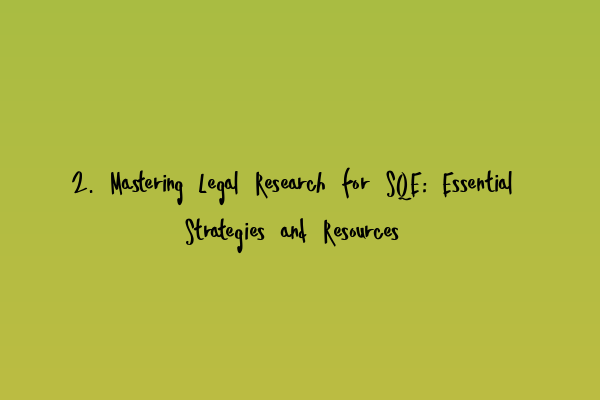Mastering Legal Research for SQE: Essential Strategies and Resources
Welcome to our comprehensive guide on mastering legal research for the Solicitors Qualifying Examination (SQE). Aspiring solicitors need to possess excellent legal research skills to excel in their exams and succeed in their legal careers. In this article, we will provide you with essential strategies and resources that will help you develop and enhance your legal research abilities.
The Importance of Legal Research in the SQE
Legal research is an integral part of the SQE, as it tests your ability to find, analyze, and apply relevant legal information to solve complex legal problems. Effective legal research allows you to understand legal concepts, identify key authorities, and construct persuasive legal arguments.
By mastering legal research, you will not only be well-prepared for the SQE, but you will also gain a valuable skill that will serve you throughout your legal career. Whether you’re drafting legal memos, preparing for client meetings, or arguing cases in court, the ability to conduct thorough legal research will be essential.
Essential Strategies for Mastering Legal Research
To excel in legal research for the SQE, it is important to adopt the following strategies:
1. Understand the Question
Before you begin your research, make sure you understand the nature and scope of the question. Analyze the question carefully to identify the legal issues involved and any specific areas of law that need to be addressed.
SQE Strategies: Proven Tactics to Ace the Solicitors Qualifying Examination provides valuable tips and techniques for approaching SQE questions effectively.
2. Identify and Analyze Key Authorities
Once you understand the question, the next step is to identify and analyze the key authorities relevant to the legal issues at hand. Key authorities may include primary sources of law such as legislation and case law, as well as secondary sources such as textbooks, journals, and legal commentary.
Using reliable and up-to-date legal resources is crucial to ensure the accuracy and credibility of your research. The SQE Case Studies: Applying Knowledge in Real-Life Scenarios article offers insights into how to apply legal knowledge to real-life scenarios, further enhancing your research abilities.
3. Utilize Online Legal Databases
The digital age has revolutionized legal research, making it easier and more efficient than ever before. Take advantage of online legal databases, such as LexisNexis, Westlaw, and Practical Law, which provide access to a vast collection of legal materials and resources.
These databases offer advanced search functionalities, allowing you to pinpoint the most relevant legal authorities and save valuable time. Familiarize yourself with the features and search techniques specific to each database to optimize your research process.
4. Develop Effective Search Strategies
Developing effective search strategies is crucial to ensure thorough and targeted research. Start by using broad keywords and gradually narrow down your search terms to refine your results. Consider using Boolean operators, such as “and,” “or,” and “not,” to combine or exclude specific terms.
Additionally, use quotation marks to search for exact phrases and take advantage of advanced search options, such as filters and facets, to further narrow down your results. The Solicitors Qualifying Examination (SQE): Your Gateway to Legal Practice article provides valuable insights into the SQE and the important role it plays in your legal career.
5. Stay Updated with Legal Developments
The law is constantly evolving, and staying updated with the latest legal developments is crucial for effective legal research. Subscribe to legal publications, newsletters, and blogs to stay informed about recent case law, legislative changes, and emerging legal trends.
Regularly reviewing legal updates will not only enhance your research skills but will also demonstrate your commitment to staying current in your legal practice. The Mastering Time Management in SQE: Strategies for Efficient Exam Completion article provides valuable insights into managing your time effectively during the SQE preparation process.
Recommended Resources for Legal Research
In addition to online legal databases, there are several other resources that can aid your legal research process:
- Legal textbooks and treatises: These resources provide in-depth analyses of specific areas of law and can serve as valuable references.
- Case law reporters: Accessing case law reporters allows you to study precedent and understand how legal principles have been applied in specific cases.
- Legal research guides: Many universities and law schools offer online research guides that provide step-by-step instructions on conducting legal research and accessing various legal resources.
- Legal blogs and podcasts: These platforms often provide valuable insights, commentary, and analysis on current legal issues and developments.
Remember, effective legal research is not only about finding the right information; it’s also about applying that information in a meaningful way. The Analyzing Mock Results for SQE: Identifying Areas of Improvement article offers guidance on evaluating your performance and identifying areas for improvement.
Conclusion
Mastering legal research is a crucial component of succeeding in the SQE and building a successful legal career. By implementing the strategies and utilizing the resources mentioned in this article, you will enhance your ability to find and analyze relevant legal authorities, construct persuasive arguments, and excel in your examinations.
Remember, practice makes perfect. Continuously refine your legal research skills through practice questions, mock exams, and real-life scenarios to become proficient in conducting thorough and effective legal research. Best of luck as you embark on your journey to mastering legal research for the SQE!
